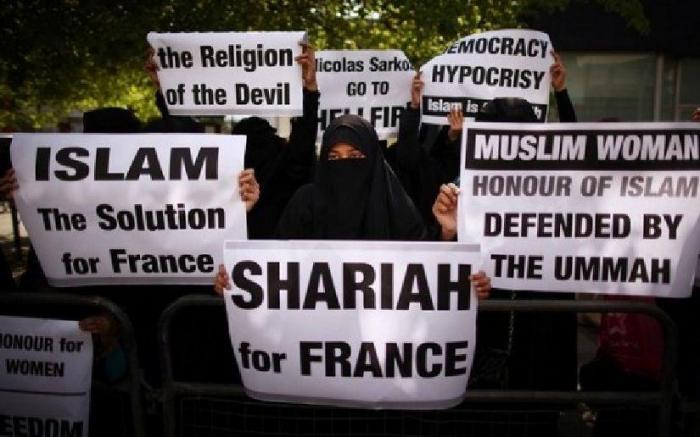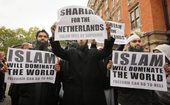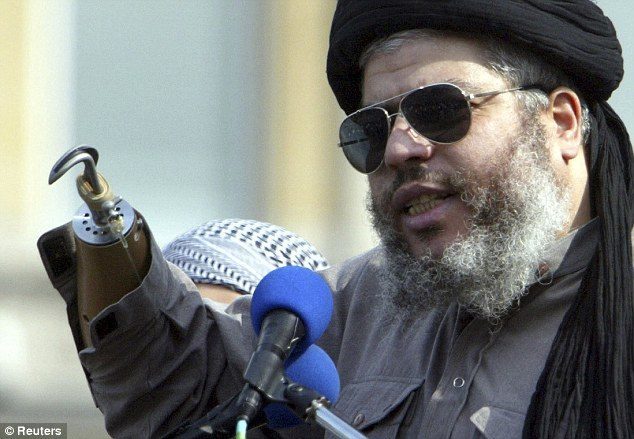luc said:
Ha, maybe :) Then again, the mention of Sharia law, interestingly enough, can trigger conservatives into anti-Muslim frenzies I guess. They may read this survey and go like uh, the refugees want to establish sharia law in the West! See, they are so backwards! Well, the survey could be read that way, and there may be some truth to the notion that Muslim tradition/culture is backwards in a sense.
It's interesting that you say 'triggered by the term Sharia'.
When Westerners hear 'Sharia', they think of these guys:
These images are from tiny groups of protesters at mosques in western Europe that are notorious for providing a platform to radical clerics. Such images have been routinely shown by the media since 9-11, giving western audiences a mirage that grossly over-inflates the prevalence of belief in such ideas among Muslims in the West (and, by extension, back in Muslim lands). One of the first mosques such images began appearing out of was the Finsbury Mosque in London. You may remember this guy:
His hands were blown off making explosives for 'the Bosnian rebels' back in the 90s. He then took up residence at Finsbury Mosque and essentially became - thanks to the media - 'The Face of Islam in Britain' around the time of 9-11. Years later, he was finally extradited to the US on terrorism charges, and what did he tell the court?...
That he was allowed to preach his version of 'sharia' because he was doing so on the payroll of British intelligence, ostensibly to 'keep an eye on the hotheads'. Yeah right! To whip them up into a fervor, more like.
So Sharia is a loaded term in the West. In ponerological terms, its original meaning has been replaced with something else. It's
now associated, in the West, with terrorism, suicide bombings, beheadings, full veils and demented intolerance for 'our way of life'. But, as you can see from Muslims' views of such things in that survey, Sharia for them is clearly not associated with those things.
So what is it?
In a word,
jurisprudence. It's the body of Islamic laws in majority-Muslim countries, drawing on the Koran, legal precedents, and jurists' legal opinions. It's their equivalent of the US Code - sort of; secular, 'man-made', state-issued law largely superseded Sharia in Muslim countries during the 20th century.
The primary difference is that Western jurisprudence is based on principles enshrined in constitutions that often, though not always, claim derivation from 'God'. This body of law is then added to by nominally secular politicians, and then applied and defined by nominally secular judges. Sharia, on the other hand, is explicitly based on principles 'derived from God' then added to/interpreted by jurists and judges that are simultaneously 'men of the cloak' and 'legal officers'. So when people say 'Islam is not like other religions; it's political', there
is some truth to that. But then, as we've seen with this rhetoric of late about 'the Christian West', Christianity too is amenable to being politicized.
Anyway, in practice, there are regional, ethnic, and other cultural differences in the interpretations and applications of Sharia law. Practice of it in most Muslim countries - certainly the more secular, modernized ones - sees
individuals deciding for themselves which parts of Sharia to follow or ignore, while Western-inspired, secular law governs most conduct by all citizens of the state. It is no coincidence that extreme, compulsory applications of Sharia proliferate in the poorest, most-bombed-out Muslim countries.
Of course Sharia in these places will take vicious, totalitarian forms. It's likewise not surprising that extreme forms of it 'take' among Muslims in Western ghettos. Like all humans, the more terrified they are, the more they crave the 'security' of absolutism and safety in unity with 'their tribe'.
Having said all that, there
has been a general 'Islamic revival' in Muslim countries in recent decades. The destruction of pan-Arab nationalist, secular ideas and movements thanks to Western interference in the Muslim world during the 20th century did its part to pave the way for monstrous religious radicalism. But it hasn't succeeded in breaking up an underlying, natural tendency toward integration and unity of 'the Muslim world' on
some basis. This doesn't mean that most Muslims want to live backwards lives: they want the infrastructure and the goods and the medical care just like everyone else; it's just that they
also want to 'do right by God'. When they are rejecting the excesses of Western liberalism, they're doing the same thing Americans did by voting in Trump last November. It remains to be seen how far they'd go in rejecting Western 'norms'. For example, will the very nation-states drawn up for them by Western powers in the 20th century survive this 'revival'?
When Bin Laden appeared and issued his call for a return of the 'Caliphate' and the 'Ummah', the West was able to portray this Islamic revival as coming from the minds of madmen intent on harming Western civilians, thereby justifying Western leaders' 'civilizing mission' of preventing such from happening by 'liberating' Muslims through 'birthing a New Middle East'. Ironically, this has only widened and deepened the appeal of 'traditional values' in the Muslim world.
I think what's really going on (with 9-11, the War on Terror, etc) is that the PTB are trying to control and retain influence over what is essentially a naturally-occurring process, one that need not involve a great 'clash of civilizations' - but which
is because the West keeps interfering in that other civilization! It's the schizoidal, circular logic of a self-fulfilling prophecy.




